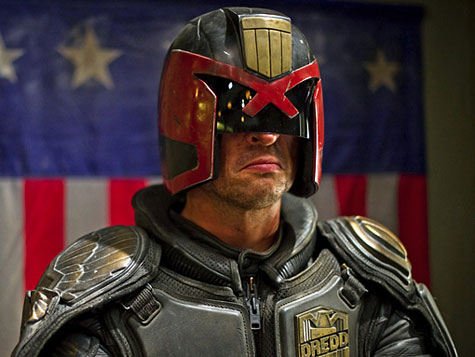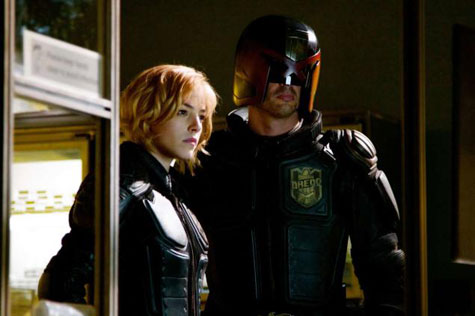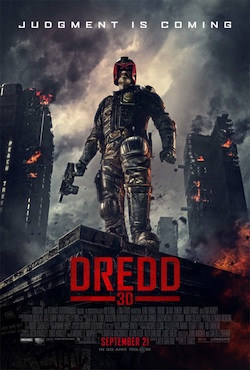So you think you know Judge Dredd, huh?
Maybe you know the character from the 1995 Sly Stallone movie and think he’s a cheesy gun-toting meathead that stomps about in black lycra and gold trim, randomly shouting catchphrases like “I AM THE LAWWWW” and “I KNEW YOU’D SAY THAT” and taking his helmet off at every opportunity to a hugely pompous orchestral soundtrack.
Maybe, like me and a lot of Brits my age, you know Judge Dredd from the weekly stories in 2000AD comic and think he’s the ultimate anti-hero; a comic character you’re meant to be afraid of rather than applaud, created by some of the UK’s greatest comic writers and artists to poke fun at everything from American superheroes to American politics and pop culture, while also being the star of numerous epic science fiction adventures.
Or maybe you don’t know anything about Judge Dredd at all, and all the above barely makes sense to you.
The important thing is it doesn’t matter. Whether you were scared by the ‘95 movie, are a huge fanboy or a complete newb, it should have zero impact on your enjoyment of the 2012 movie adaptation Dredd which sets out with only has one main objective: to be a cool, ultra-violent, low budget sci-fi action movie.
The question is – does it succeed?
First off: the setup. It’s the 22nd century, and the earth has been ravaged by nuclear war (not the vague, cop-out “environmental disaster” of the 1995 movie). What is left of America’s population is crammed into a few overcrowded, decaying cities (the largest of these, and the setting for the movie, being Mega-City One), most of them trying to survive their lives in huge but similarly overcrowded arcologies known as city-blocks. With the population in such appalling conditions it’s no wonder that crime is a massive problem for Mega-City One. Since the end of the aforementioned nuclear war martial law was introduced and a system of street Judges created; lawmen that can not only make arrests but also dispense justice on the spot. Quite literally they are judge, jury and—when they themselves deem necessary—executioner.
The problem is that even though the war ended many decades ago, martial law and the judge system has never been repealed. Make no mistake – Mega-City One is the very definition of a fully blown, fascistic, police state; apart from a mayor and a few token politicians the unelected Justice Department runs every aspect of the city with a brutal, iron fist.

Enter the eponymous Joe Dredd, one of MC1’s most feared and hardline Judges. As the movie opens he’s been tasked with evaluating Cassandra Anderson, a mutant rookie judge with powerful psychic powers. Their first assignment takes them to Peach Trees block to investigate a gang killing, where they discover that the block is run by Ma-Ma, an ex-hooker turned brutal drug-lord who is manufacturing and pushing the new narcotic Slo-Mo. To put it lightly, she isn’t too pleased to see them. She locks the entire block down, putting a bounty out on the two Judges’ heads, who find themselves forced to fight their way up to Ma-Ma’s den as the block rapidly descends into a bloodbath.
The beauty of this simple, straightforward plot is that it allows Dredd to set up the world of Mega-City One and the Judges while sticking within the production’s relatively small budget. It must have been hugely tempting for screenwriter Alex Garland (28 Days Later, Sunshine)—a lifelong Judge Dredd reader—to jump in and try and film one of the comic’s more epic, large-scale story lines. But he hasn’t, clearly understanding both the production’s limits and what the aims of this movie had to be. Besides, the Judge Dredd strips were not all epic, months-long story arcs – some of the comic’s most loved tales were 10-page, brutal self-contained one-offs. Dredd feels exactly like one of those. And forget those moaning that the story is rip off of the plot of Gareth Evans’ excellent martial arts flick The Raid. Despite the similarities, Dredd was actually in production before The Raid was finished, and in reality the movies don’t feel that similar at all. Dredd feels more in line with classic 80s action movies like John Carpenter’s Assault on Precinct 13 or Paul Verhoeven’s Robocop – the latter being rather obviously influenced by the original Judge Dredd comics, as Verhoeven has acknowledged.
At the top of this article I was pretty harsh on the 1995 Judge Dredd movie, and for the main that’s largely justified – that movie abandons the tone and satire of the strip in order to just make yet another action vehicle for Sylvester Stallone. Also: Rob Schneider. But there was one thing that movie got very right: the look and feel of Mega-City One itself. From the opening flight over MC1 to the street scenes and the unexpected fan easter egg of wardroid Hammerstein (actually taken from another 2000AD comic, ABC Warriors) it is clear that the art department on that movie were not only being faithful to the source material but had the money to do it. The same is not quite the same here. Dredd was produced on a much smaller budget than its predecessor, and corners had to be cut. The most obvious is in the depiction of MC1 – for a start we don’t see much of it, with most the action taking place inside Peach Trees, and what we do see lacks the over-the-top scale and aesthetic of the strip’s cityscapes. It’s a shame, but it’s hard to fault the movie’s creators for this. There were obviously budget limitations, and focusing the story around the interior of the city block (which is mainly practical sets and looks superb) was an excellent solution. Plus, it’s an issue that will only really bother hardcore fans – and the fact is Dredd has more than enough to keep them happy.
For a start there are the characters, which feel like they have stepped right off the same comic pages that turned my 11 year-old fingers black with print. Dredd himself is tone perfect – Karl Urban managing to pull off the impossible; in theory gruff, monosyllabic Dredd should be a cinch, but in fact the character is a little more complex than that. The Joe Dredd of the comics had a sense of humor—a dry, brittle one, but it was there—and was also known to show flashes of humanity from behind the visor on occasion. Urban manages to capture all of this. Lena Headey hands in a similarly impressive performance as psychotic gang boss Ma-Ma – brutal and unflinching, yet strangely empathetic. But perhaps the real stand out performance is Olivia Thirlby as rookie judge Anderson.

I’ll be honest, when I heard Anderson was going to be in the movie I was a little concerned. A hugely popular character in the comics, her psychic powers work well on the page, but I was less sure of how they would translate to the screen. I worried that they might feel shoehorned in and break the movie’s serious, dark tone. I couldn’t have been more wrong. It’s hard to explain without dipping into spoiler territory, but the scenes where Anderson uses her powers are not only sinister and surprising, but integral to both the movie’s plot and atmosphere.
But Anderson has a much more important role here – she provides something that is vital to any Dredd story; moral ambiguity. As I mentioned earlier Judge Dredd depicts a fascist regime, a true police state – and amongst the action and adventure it can be easy to forget this. Anderson doesn’t let us. It’s clear from the very beginning she has doubts about becoming a Judge, and a day on the job with Dredd doesn’t seem to be talking her round. Again, it’s hard to not go into much more detail without spoiling things, but she soon finds herself questioning both Dredd’s and her own actions – and the often speechless interplay between Thirlby and Urban is one of the movie’s highlights.
And I’ve not even mentioned the action sequences. The comic was always violent—it’s part of the reason it was such a hit with snotty nosed kids like me—and the movie doesn’t pull any punches. Don’t be mistaken, this is a hard-R action movie—heads explode, blood splatters, bullets pierce flesh—all in 3D. And yes, it IS worth seeing in 3D. I’m usually as skeptical about the format as the next person, but in Dredd it’s been used well – most noticeably in the trippy Slo-Mo drug sequences.
Trust me, this is not a movie you want to wait and see at home. Go and see it at the theater. Whether you’re a fan of the comics or have never seen a single page of them, Dredd is arguably the best action or science fiction movie so far this year—a long way from the gleaming adventure of Avengers or the plodding misery of The Dark Knight Rises—it is a bold, relentless comic book movie that explodes across the screen. Don’t miss it.
When he’s not writing for Tor.com, Tim Maughan writes science fiction – his critically acclaimed book Paintwork is out now, and has been picking up support from the likes of Cory Doctorow and Ken MacLeod. This month he has a short story about the gamification of looting – “Limited Edition” – published in New Scientist magazine’s futurism off-shoot Arc 1.3.











Good article, Tim. I’m hoping to check it out this week. I’m also psyched that you were able to check out The Raid. That is hands down one of the best times that I’ve had at the movies this year.
Hey, just wanted to say that it’s “martial law”. As in law that is run by the military. That was something that I got hung up on for a while as well.
I saw the film opening day. Stupendous. Unfortunately, it’s already being called a flop and is rapidy vanishing from theatres. What can you do?
I have to agree with you that this is a great movie. I will admit that I may have had a drink or two..or three, and I may have fallen asleep when we saw it on opening night. But I remedied that by seeing it the next morning. The 3D was amazing, especially in the slow motion shots. This was a movie I didn’t regret paying twice to see.
Yeah, I really enjoyed this in the cinema. Made up for the horrible Sly version…
As a nigh-lifelong Dredd fan (I am four years older than the strip) I thought this movie was as near perfect as possible. The bits set outside Peachtrees were less futuristic-looking than the city in the original but in ways that make sense given budget limitations, and the character stuff is note-perfect, as is the particular approach to the action scenes; Dredd and Anderson appraoch their problems in ways that feel like competent people with police/military training rather than action heroes, and combining that with the sometimes not-entirely-realistic visuals works a lot better than I would have thought. It’s a nice sleek plot for newcomers and full of the sort of little details that add to it for veterans without getting in the way; almost all the other blocks are named for 2000AD creators, the graffiti has some nice little allusions, and I nearly cracked up over the “Krysler’s Mark” movie poster.
From what Alex Garland has said, if Dredd makes enough money, sequels will expand the universe – the plan would appear to be to do a Cursed Earth story for Dredd 2 with elements from several different classic comic stories, and the Dark Judges in Dredd 3.
If the movie is your first experience of Dredd and you are looking for more, a goodly proportion of the 35 years of advancing-in-realtime continuity is available in collected editions – I recommend starting with Collected Casefiles 05 as Dredd took a couple of years to find its feet, and that collection has two of the definitive classic stories and some of the best of the artwork that established Dredd’s look. I’d note also that the DC Comics Judge Dredd titles from the 1990s are not in the original continuity and are not, IMO, much good (nor is the younger-readers title Lawman of the Future), but the Dredd/Batman crossovers are in original continuity and are mostly quite impressive.
Watched this a few days back. Seconding the comments that it’s quite a fantastic adaptation. Faithful to the character’s persona & somewhat less so to the setting (no obvious mutants/ freaks/ flying whats-its, but has the gritty feel down pat). Karl Urban is fantastic as always, especially considering he’s only got 50% of his face available to emote (No helmet-less scenes here!). Lena Headey is freakinshly villain-y. The ultra-violence is amazing (but keeps with the source material), and the soundtrack is fantastic.
Avon Barksdale should really get out of the drug trade.
It’s a great movie that will fade into obscurity and be considered “bad” by everyone because it didn’t make a bajillion dollars in it’s first day. It’s really sad. :(
This is a cyberpunk gem. Dark satire, gritty and gorgeous. I’ve never read the comic so I can’t compare it, but I’d like to see a few more Dredds passing their particular brand of judgment on the endless run of Transformer movies.
Also, of course, Avon Barksdale. Another point in the trend of Wire alumni showing up unexpectedly in genre… Tommy “Littlefinger” Carcetti being the most obvious one.
a1ay: Nice spot. I almost yelled out in the movie last night. AVON! He just can’t seem to leave the towers. At least he’s moved up from slinging to production.
Now that I’ve seen the movie, I still prefer The Raid:Redemption, but Dredd was certainly a fun movie to watch.
My favorite aspect of Dredd was that it wasn’t about saving all of MC-1 (or The World/Galaxy/Universe), but that it was about a single block – mostly. I think that movies that do the saving the
World/Galaxy/Universe then have no where to go in a sequel.
So, Dredd just being about the 2 judges and the druglord in a single block is an excellent way to go. So, if it does well (and I really, really hope it has) and a sequel is ordered, they can step it up.
Basically, it is an excellent Judge Dredd story put to film. I liked it.